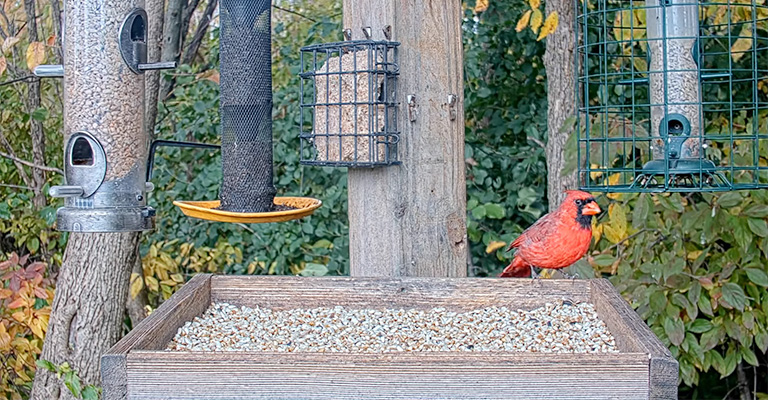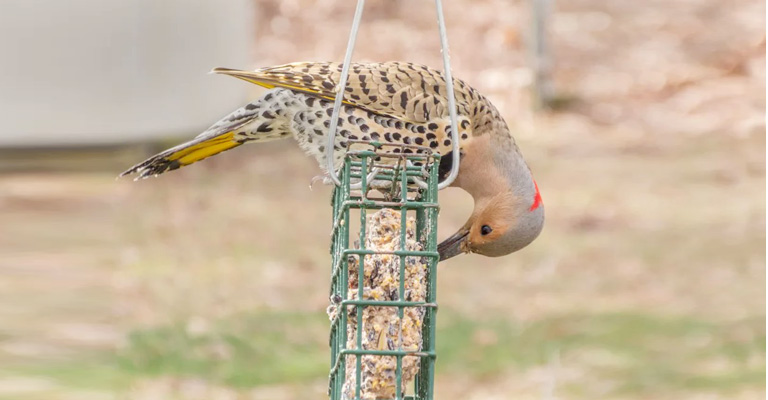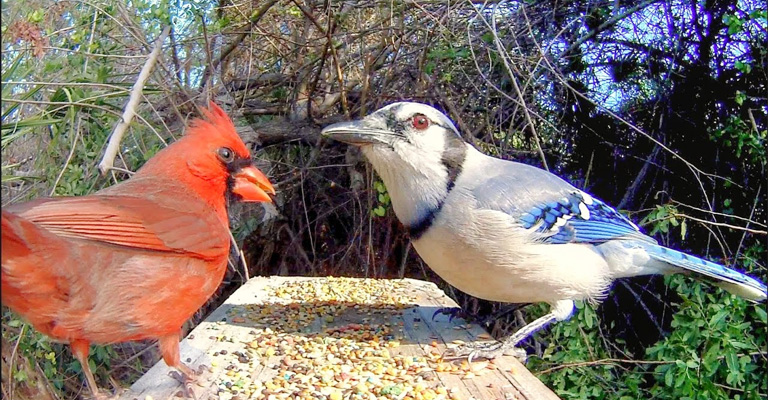The Northern Cardinal, with its vibrant red plumage and distinctive crest, is a beloved and easily recognizable backyard bird in North America. Many bird enthusiasts eagerly seek ways to attract these beautiful birds to their feeders and gardens.
Among the various foods offered to Cardinals, cracked corn often finds its place as a favored treat. But can Cardinals eat cracked corn, and is it a suitable part of their diet?
In this exploration, we delve into the dietary preferences of Cardinals and their relationship with cracked corn. We’ll uncover the reasons why cracked corn is an appealing choice for these iconic birds and understand how it can be a valuable supplement to their nutritional needs.

Can Cardinals Eat Cracked Corn?
Yes, Cardinals can eat cracked corn, and it is a popular choice among backyard bird enthusiasts for attracting these vibrant red birds.
Cracked corn is a nutritious and energy-rich food source that can supplement their diet, especially during the colder months when natural food supplies may be scarce.
Cardinals are primarily seed-eaters, and cracked corn provides a good balance of carbohydrates and fats, offering the extra calories needed to keep warm in winter. It’s important to note that while Cardinals enjoy cracked corn, it should be part of a varied diet that includes other seeds, fruits, and insects.
Also, ensure that the cracked corn is clean and dry, as wet or moldy corn can be harmful to birds. Providing a consistent source of cracked corn in a bird feeder can attract not only Cardinals but a variety of other bird species to your backyard, enhancing your birdwatching experience.
Is Cracked Corn Safe For Birds?

Cracked corn is generally safe for many bird species and is a popular choice among bird enthusiasts. It’s a nutritious and energy-rich food source that can be a valuable addition to a bird’s diet, providing essential carbohydrates and fats.
Many ground-feeding birds, such as sparrows, doves, and quails, readily consume cracked corn. However, it’s crucial to use cracked corn in moderation and consider the specific dietary preferences of the birds you aim to attract.
While cracked corn is safe for many birds, it’s less suitable for some species that primarily feed on insects or nectar, like hummingbirds or warblers. Additionally, maintaining proper hygiene is essential. Keep the corn dry and clean to prevent mold growth, which can be harmful to birds.
Overall, when used appropriately and as part of a well-rounded diet, cracked corn can be a valuable and safe food source for many bird species in your backyard or feeding area.
Why Should Cardinals Eat Cracked Corn?
Cardinals, with their striking red plumage and distinctive crests, are a beloved sight in many backyards. Providing cracked corn to these beautiful birds can offer several benefits:
Energy Source
Cardinals, like many birds, require a high-energy diet, especially during the colder months. Cracked corn is rich in carbohydrates and fats, providing a readily available energy source to help them stay warm and maintain their daily activities.
Winter Survival
In regions with harsh winters, cracked corn can be a crucial food source for Cardinals. It’s a valuable supplement to their diet when natural food supplies, such as insects and fruits, become scarce.
Easy To Digest
Cracked corn is relatively easy for Cardinals to digest. Its smaller size compared to whole corn kernels makes it more accessible, particularly for younger or less experienced birds.
Ground-Feeding Preferences
Cardinals often forage on the ground. Cracked corn is ideal for ground-feeding birds, as it can be scattered on the ground or placed in low-lying feeders, allowing Cardinals to feed comfortably.
Attracts Other Species
While Cardinals enjoy cracked corn, it’s also a favorite of other ground-feeding birds like sparrows, juncos, and mourning doves. Providing cracked corn can create a diverse and active feeding area that benefits a variety of species.
Year-Round Appeal
Cracked corn can be offered year-round, providing a consistent food source for Cardinals. They are known to visit feeders regularly, so keeping a steady supply of cracked corn can help attract and retain these beautiful birds in your backyard.
Observational Delight
Cardinals are known for their striking appearance and melodious songs. Offering cracked corn can make your backyard a hotspot for birdwatching, providing you with opportunities to observe and appreciate these charismatic birds up close.
Remember to offer cracked corn in moderation as part of a balanced diet that includes other seeds, fruits, and insects. Providing fresh and dry cracked corn, along with proper feeding stations, can make your backyard a welcoming haven for Cardinals and other bird species throughout the year.
What Do Cardinals Eat?

Cardinals have a varied diet that consists of a range of foods. Here are some types of foods commonly eaten by Cardinals:
Seeds
Cardinals are primarily seed-eaters. They have a particular affinity for sunflower seeds, both the hulled and black-oil varieties. Offering a mix of seeds in bird feeders can attract Cardinals to your backyard.
Fruits
Cardinals enjoy a variety of fruits, including berries, apples, and cherries. These fruits provide essential vitamins and nutrients and are particularly appealing during the summer and fall when natural fruit sources are abundant.
Insects
Insects are a vital part of a Cardinal’s diet, especially during the breeding season when they need protein for their young. They hunt insects like caterpillars, beetles, and spiders.
Nuts
Cardinals readily consume nuts, such as peanuts and almonds. Nuts are a good source of protein and healthy fats, making them a valuable addition to their diet.
Suet
Suet, a high-energy food made from animal fat, is attractive to Cardinals, especially in the winter. Suet cakes can be hung in feeders to provide extra calories during colder months.
Cracked Corn
As mentioned earlier, cracked corn is a favorite food for Cardinals. It’s a valuable source of carbohydrates and fats, helping them maintain energy levels, particularly during winter.
Mealworms
Cardinals are known to eat mealworms, which are rich in protein. Dried or live mealworms can be offered to attract these birds to your feeder, especially when they are raising their young.
By providing a diverse selection of these foods in your backyard, you can create an appealing feeding environment that will attract Cardinals and offer them a balanced and nutritious diet throughout the year.
Which Birds Eat Cracked Corn?
Cracked corn is a popular bird food that attracts various avian species due to its high energy content and easy accessibility. Here are the birds that readily consume cracked corn:
Northern Cardinals (Cardinalis Cardinalis)
Cardinals are known to be fond of cracked corn. Their striking red plumage and distinctive crests make them a favorite among backyard birdwatchers.
Cracked corn provides them with the necessary energy, especially during colder months when natural food sources are scarce.
Dark-Eyed Juncos (Junco Hyemalis)
These small, ground-feeding birds are frequent visitors to feeders filled with cracked corn. During the winter, juncos often forage for seeds and grains, and cracked corn is a valuable part of their diet.
Mourning Doves (Zenaida Macroura)
Mourning doves are known for their gentle cooing calls and are often seen feeding on cracked corn scattered on the ground. They enjoy a mix of seeds, but cracked corn is a particular favorite.
Eastern Bluebirds (Sialia Sialis)
Eastern Bluebirds are cavity-nesting birds that occasionally supplement their diet with cracked corn. They primarily feed on insects and berries but may be attracted to feeders with this energy-rich food.
American Goldfinches (Spinus Tristis)
American Goldfinches are typically seed-eaters, and while they prefer smaller seeds like sunflower and thistle, they may visit feeders containing cracked corn, especially in mixed seed blends.
White-Throated Sparrows (Zonotrichia Albicollis)
White-throated sparrows are ground-foraging birds that readily consume cracked corn along with other seeds. They are a common sight in many backyards during the winter months.
Red-Winged Blackbirds (Agelaius Phoeniceus)
Red-winged blackbirds are omnivorous and often feed on grains like cracked corn. They can be seen perched near feeders or foraging in fields for this and other seeds.
Cracked corn serves as a versatile food source that attracts a wide range of birds, making it a valuable addition to bird feeders for birdwatchers looking to attract diverse avian species to their backyard.
FAQs
Can Cardinals eat cracked corn exclusively?
Cardinals can eat cracked corn, but it should not be their sole source of food. While cracked corn provides essential carbohydrates and fats, Cardinals need a balanced diet that includes a variety of seeds, fruits, and insects to meet all their nutritional requirements.
Is cracked corn safe for Cardinals?
Yes, cracked corn is generally safe for Cardinals. It’s a nutritious food source that can be offered year-round. However, it’s essential to provide clean and dry cracked corn, as moldy or spoiled corn can be harmful to birds.
How should I offer cracked corn to Cardinals?
You can offer cracked corn in platform feeders, ground feeders, or scattered directly on the ground. Cardinals are ground-feeding birds, so providing cracked corn at low levels or on the ground makes it easily accessible to them.
Are there other foods Cardinals prefer over cracked corn?
While Cardinals enjoy cracked corn, they have a varied diet preference. They are particularly fond of sunflower seeds, both hulled and black-oil varieties, as well as fruits, insects, and nuts. Offering a mix of these foods can attract Cardinals to your backyard.
Can Cardinals eat whole corn kernels, or should they be cracked?
Cardinals can eat both whole and cracked corn kernels. However, cracked corn is more accessible and easier for them to consume. Whole corn kernels are often preferred by larger birds like crows or doves. Providing cracked corn ensures that Cardinals can readily enjoy this nutritious food.
Conclusion
Cracked corn is indeed a suitable and appreciated food source for Cardinals. These iconic birds, known for their vibrant plumage and melodious songs, readily consume cracked corn as part of their varied diet.
It provides essential carbohydrates and fats, offering the extra calories needed, particularly during the harsh winter months.
While Cardinals enjoy cracked corn, it’s important to provide a balanced diet that includes other seeds, fruits, and insects to ensure their nutritional needs are met comprehensively.
By offering cracked corn alongside other high-quality bird foods, birdwatchers can create a welcoming environment for Cardinals, enhancing their birdwatching experience and contributing to the well-being of these striking avian visitors in their backyard.